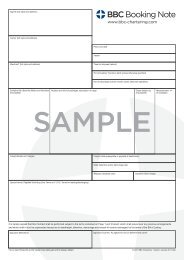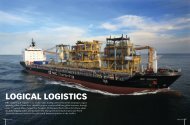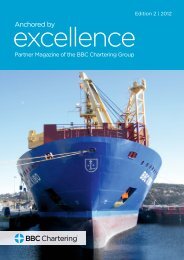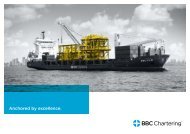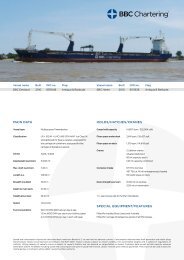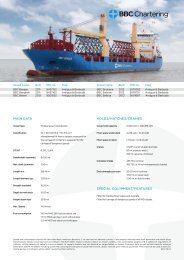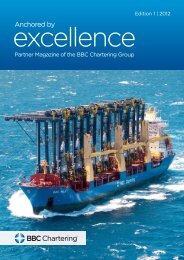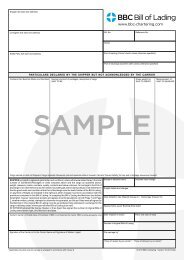Excellence, 7th Edition - BBC Chartering
Excellence, 7th Edition - BBC Chartering
Excellence, 7th Edition - BBC Chartering
You also want an ePaper? Increase the reach of your titles
YUMPU automatically turns print PDFs into web optimized ePapers that Google loves.
What were specific draw-backs in Brazil and whatshould be improved?WdB: The oil and gas sector got hit worst. Tenders toexplore deposits were suspended back in 2008 becauseof changes in legislation. As a consequence,projects were delayed significantly, some even indefinite.An example is the Comperj-Petrochemicalcomplex in Rio de Janeiro. The complex should havebeen operational already in 2011, but its first refineryshall not be ready before 2015.Spanish companies e.g. Isolux Corsán, Acciona andCopasa are very active. The project portfolio of thesecompanies include four lots of Rodoanel Trecho Nortede Sao Paulo, the power transmission line betweenMacapá and Manaus, the BRs 116 and 324, Line 4 ofthe São Paulo Subway and the breakwaters of the Açusuperport.Certainly this list will increase with the new tenderson highways, railways, ports and airports, which werelaunched in the second half of last year.We hope the government will undertake further measuresproviding frame parameters for sustainablegrowth. With that we should be able to reinforceconfidence and trust in Brazil’s economy and underlineits growth ability attracting further foreign investments.How do you see growth prospects in the future andhow would they impact breakbulk shipping?Natalie Jones (NJ): We think the projections for Brazil’seconomy are more positive for 2013 and consecutiveyears. The progress seems a result of the infrastructureworks for the world’s two largest sporting events:the World Cup 2014 and the Olympics 2016. Largeprojects require the handling of all types of breakbulkcargoes for the construction and maintenance of roads,improvements in public transport, ports, airports,stadiums and arenas for these events.How is <strong>BBC</strong> <strong>Chartering</strong> perceived in South America?NJ: <strong>BBC</strong> <strong>Chartering</strong> has expanded significantly since itsbeginning in South America and continues to believein the market. We feel the market becomes more andmore aware of our efforts, our fleet quality and the levelof performance that we can deliver.<strong>BBC</strong> <strong>Chartering</strong> currently has about 13-18 vessels aloneat the Brazilian coast per month. Besides enjoyingpremier connections for project imports, this givesBrazilian shippers many opportunities to move exportcargo to any port in the world. Our experience is thatclients are excited about <strong>BBC</strong> <strong>Chartering</strong> when they hearabout us. Still there is a large share of the market that isnot educated about our service offerings. Building ourbrand, increasing awareness of our possibilities is anongoing job and there is much to do.To what extent are foreign construction companies involvedin that?In your opinion, what are further challenges that needto be tackled to foster growth in Brazil?WdB: We see many European companies taking majorshares of the pie here. They already have contractsexceeding R$ 10 billion and there is appetite for more.WdB: We feel that current port infrastructure is one ofthe biggest obstacles to the expansion of the maritimeindustry in the country and the continent. Productivity ofWashington de Barrospage 12 | excellence



